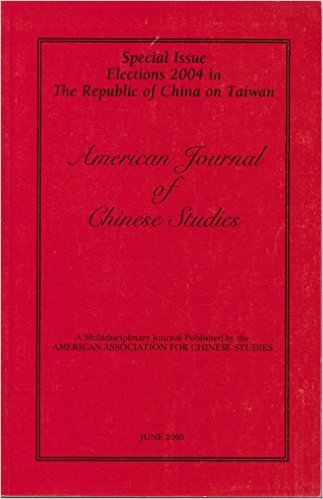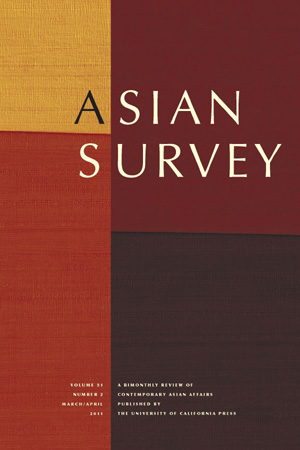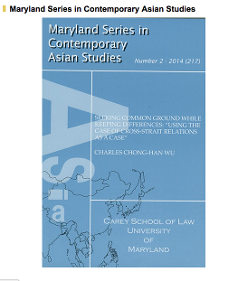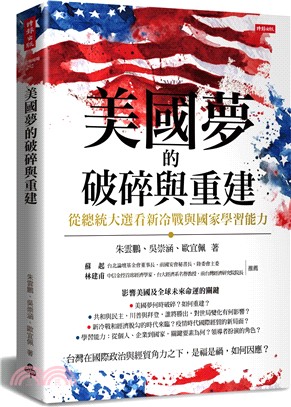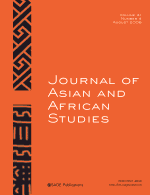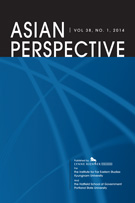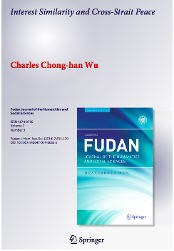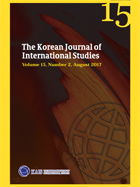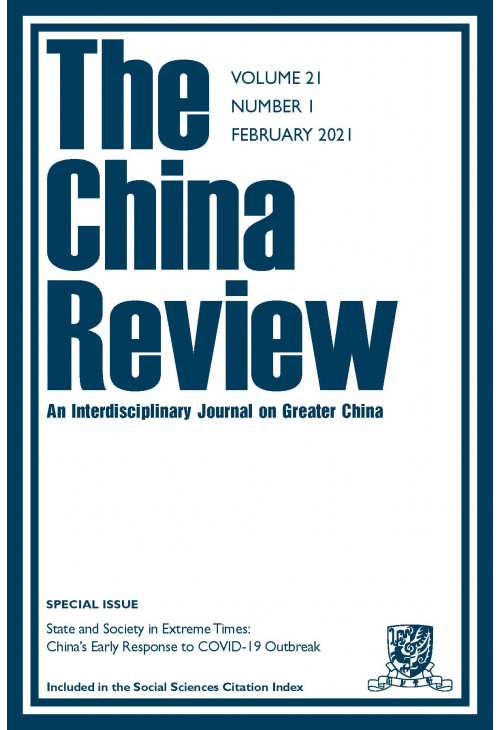*Peer-Reviewed Articles
- Wu, Charles Chong-Han. 2022. Income Inequality and the Allocation of China's Foreign Aid. Journal of Asian and African Studies. (with Jerry Lin) (online first)
- Literature on the impacts of Chinese development finance to developing countries has suggested that China’s links to the global economy are contingent on their foreign policy. This study, however, concludes that China’s foreign aid was directed not to countries with poor economic conditions, but toward inefficient and mismanaged economies with higher income inequality. We used a negative binomial model with a mixed effect to estimate the relationship between income inequality and China’s foreign aid between 2000 and 2017. Our findings show that the more pronounced the income inequality in a state, the more likely it will receive aid from Beijing.
- Wu, Charles Chong-Han. 2022. The Maritime Silk Road Initiative and Its Implications for China's Regional Policy. Chinese Political Science Review (online first)
- This study attempts to compare previous maritime issues between China and neighboring countries, including the ongoing cooperation between Beijing and ASEAN countries in Southeast Asia. This paper suggests that the promotion of the Maritime Silk Road Initiative (MSRI) can mitigate relevant maritime militarized interstate disputes (MIDs) in the region. Creating coordinated foreign policy and sharing information could help prevent conflict, as scholarly research has demonstrated. The empirical findings of this study also help identify the crucial elements that determine how China can improve its maritime policies under the MSRI, with a special focus on the case of the Philippines, which has experienced the most continuous friction over maritime boundaries with China.
- Wu, Charles Chong-Han. 2022. Way of Authoritarian Regional Hegemon? Formation of the RCEP from the Perspective of China. Journal of Asian and African Studies (with Intae Yoo) (online first)
- How has China contributed toward the conclusion of the Regional Comprehensive Economic Partnership (RCEP)? The extant literature tends to either undervalue China’s role or emphasizes the absence of China’s willingness to realize the RCEP. However, it is difficult to form region-wide multilateral preferential trade agreements (PTAs), such as RCEP, without any significant contribution from a regional hegemon, such as China. This paper, thus, argues that China has contributed significantly toward the conclusion of RCEP by engendering incentives for member countries to join through multiple cooperative structures. These cooperative structures involve China-led bilateral PTAs and international development forums, which include the Belt and Road Initiative and Asian Infrastructure Investment Bank. With the gradual shift from bilateral to multilateral PTAs and forum-linkage strategies, China turned to be more assertive in concluding the RCEP than in the early years of RCEP negotiations, as evidenced by the discourse of political and opinion leaders.
- Wu, Charles Chong-Han. 2021. The End of Washington's Strategic Ambiguity? The Debate over US Policy toward Taiwan. China Review, Vol.21.no.2, p177-202
- The Trump administration has shown a strong inclination to play the “Taiwan card” and strengthen relations with Taipei in lieu of Washington’s traditional strategic ambiguity. As the US-China trade competition escalated after 2018, the contending bilateral relations between Beijing and Washington created an opportunity for the administration of Tsai Ing-wen to adopt a more provocative strategy toward Beijing. In order to prevent conflict resulting from Taiwan’s new approach, more fundamental discussions on the definitions and dynamism of why the US should adjust this traditional security policy are needed, this research suggests, in order to address the question of whether the US should change to strategic clarity across the Taiwan Strait or adhere to its traditional strategic ambiguity. Moreover, this study also covers relevant literature on strategic ambiguity, investigating the changing patterns of decision-making in US foreign policy with regard to cross-Strait relations and US arms sales to Taiwan.
- Wu, Charles Chong-Han. 2019. Why Do States Hedge in East Asia? An Empirical Study on Hedging. Asian Perspective, vol.43. no.3, p557-584
- The purpose of project is to investigate whether countries in East Asia are acting anomalously from traditional balancing and bandwagoning assumptions in the face of China’s reemergence as a significant regional power. In East Asia, hedging takes the form of sending ambiguous alignment signals toward the United States in return for more autonomy by states that have no official alliance with Beijing. Incorporating Lim and Cooper’s (2015) redefinition of hedging, this study focuses on the conditions under which China’s neighbors adopt hedging behaviors. This paper aims to show that coercive capability indicators, including national capability and a U.S. military presence, are major factors in decisions by countries in East Asia to adopt hedging strategies. The findings suggest that when countries in this region seek to maximize economic benefits with Beijing, they also decrease certain security assurances from Washington as a hedge against Beijing’s influence over their national affairs.
- Wu, Charles Chong-Han. 2018. Taiwan's Hedging Policy under the Competition and Cooperation in Sino-U.S. Relations. EurAmerica, vol.48. no. 4, p513-547
- In the case of East Asian strategies towards a rising China and the
existing U.S. influences, unless the dominant powers insist, decision
makers have enough space hedging without leaning to either side. The
“Pivot to Asia” policy by the previous Obama’s administration and
Trump’s “Indo-Pacific” policy in 2017 has shown that there is not only
economic cooperation between Beijing and Washington, but the continuous military competitions also need our attention between these
two great powers. Thus, Tsai Ing-wen’s administration has adopted a
more practical position that is best described as “hedging” yields with
more flexible options. This paper aims to show the comprehensive studies in decisions by Ma Ying-jeou and Tsai Ing-wen to adopt hedging
strategies. The findings demonstrate that Taiwan has continuously man-
aged its policy by using hedge over the current regional affairs.
- Wu, Charles Chong-Han. 2017. Understanding the Structures and Contents of National Interests-An Analysis of Structural Equation Modeling, Korean Journal of International Relations, vol.15, no.3, p327-356
- Scholars of international relations have consistently applied a single indicator to represent states' interests. However, the concept of interests will be illusive if we consider using only one single variable. The author proposes and estimates a hierarchically organized states’ interests structure in which specific interests are derived from abstract value. These objectives in turn are assumed to be constrained by a core value about states' vital interest in international society. Applying confirmatory factor analysis (CFA) by LISREL, the empirical results suggest that specific interests can be structured with three major objectives that describe the general direction the government should take in international affairs: security, economic, and community interests. These measures provide better theoretical and empirical representations for what we understand about states' interests in world politics.
- Wu, Charles Chong-Han. 2016. Common Interests and Two-Level Game Theory in the South China Sea Dispute, American Journal of Chinese Studies, vol.23, p145-158
- Previous studies already demonstrate that interest indicators from realists demonstrate significant results between interstate conflict and states’ interests. By investigating cross-Strait relations, this paper suggests that the deepening of both political and economic interests boosts the political will to implement peaceful talks for the China-Taiwan dyad. However, the exchange of opinions and cooperation based on the common interests did not provide the cross-Strait relations any further stability during Ma’s second presidency. In contrast, the social split and contesting politics in Taiwan slowed down the cooperation between Beijing and Taipei. Since international and domestic politics affect each other, we need to apply Robert Putnam’s two-level game theory to investigate if there are any interactions between the power and preferences of the major actors at their domestic level, especially on domestic constituents’ preferences. The author uses the 2014 Sun Flower Movement in Taiwan and the South China Sea issue to illustrate the importance of aggregation of states’ interests between Beijing and Taipei, and argues that the maintenance of status-quo on the South China Sea issue may provide more stability to the cross-Strait relations.
- Wu, Charles Chong-Han. 2016. Taiwan's Hedging Strategy against China-The Strategic Implications of Ma Ying-Jeou's Mainland Policy. Asian Survey, vol. 56, no.3 , p.466-487
- This article addresses the identifiable conditions for hedging
strategies. By examining specific cases of policy choices and political
situations in a triangular
framework, the author suggests that Taiwan’s hedging behavior against China is
sensitive to local variation in power capabilities, economic intention, and the security commitment from the
United States.
- Wu, Charles Chong-Han. 2016. Alliance Commitment and the Maintenance of the Status-Quo. Asian Perspective, vol.40, no.2, p.197-221 (with John Fuh-Sheng Hsieh)
- This study shows that alliance commitment is the key to the maintenance of the status quo between a weak challenger and a major power attacker. In order to verify our theory, we employ relative data from Benson’s typology of compellent military alliances (Benson, 2011, 2012) and conduct empirical tests for our theoretical hypothesis. The statistical results comply with the theory, indicating that a trustful and strong military commitment creates negative effects on the status quo. We examine the cases of the Korean War and the U.S.-China-Taiwan relations to buttress our arguments. The latter case also shows the need to modify our original model under certain conditions.
- Wu, Charles Chong-Han. 2014. Interest Similarity and Cross-Strait Peace. Fudan Journal of Humanities and Social Sciences, vol.7, no.3, p.451-470
- Studies in this article support the peace-building effects of interest similarity, and we have to re-evaluate the current world peace through a new lens of interest. Previous research has informed us that states with similar security and/or economic interests will experience fewer conflict onsets. This study begins with research treating interest similarity as a “facilitating condition for conflict,” and argues that not only security interest, but also capitalist economic policies that lead to the deeper integration of an economy into international markets should be considered one of the ultimate driving forces of peace. By discussing a brief description of bilateral peace in the China-Taiwan dyad, this article concludes that the China-Taiwan dyad has less possibility of encountering military conflict if both governments can maintain similarity in their security interests. Moreover, the author distinguishes different models in the capitalist peace theory, which include the free-market and the social-market. Accordingly, this article examines three different prestigious capitalist models: trade, capital openness, and contract-intensive economy as social-market theory. The results suggest that the China-Taiwan case is an appropriate case for the trade (Weede 1996) and capital openness models (Gartzke 2007). Future studies need to be more aware of the model chosen for capitalist peace on cross-Strait relations.
- Wu, Charles Chong-Han. 2012. The Strategic Triangle: U.S-China-Taiwan Relations. Sharnoff's Global Views, December, 2012 (on-line journal article)
- When it comes to the U.S.-China-Taiwan relations, the initial assertion tells us that without the U.S. backing, declaration of de jure independence is simply not a feasible option for Taiwan. But the complicating factor is that the U.S. not only has an interest in the security of Taiwan but also in stable relations with China, particularly after the growing ties between the U.S. and China in almost all areas over the years. Thus, the maintenance of the status quo turns out to be the U.S. policy, too. To achieve such a goal, the U.S. has adopted strategic ambiguity as the cornerstone of its policy toward the cross-Strait relations for the past few decades.
*Peer-Reviewed Books
- Wu, Charles Chong-Han. 2014. Seeking Common Ground While Keeping Differences: The Strategic Analysis of the Cross-Strait Relations. Baltimore, MD: University of Maryland School of Law, Maryland Series in Contemporary Asian Studies. (book)
- Wu, Charles Chong-Han. 2020. The Breakage and Reconstruction of the American Dream. Taipei: China Times Publishing. (with Chu Yung-pen & Oh Yi-pei) (book in Chinese)
- Wu, Charles Chong-Han. forthcoming. Rethinking States' Hedging Strategy in Asia Pacific. London: Routledge. (book)
*Peer-Reviewed Book Chapters
- Wu, Charles Chong-Han. 2017. The Comparison between Democratic Peace Theory and Interest Peace Theory. in Tang Chih-Mao ed. The Studies of Peace and Conflicts: Theoretical and Empirical Analysis. Taipei: Wu-Nan Corp. (book chapter in Chinese)
